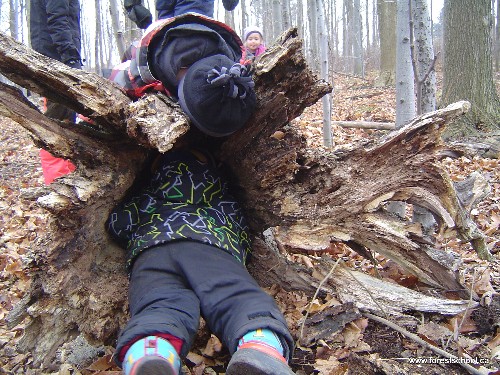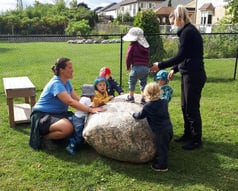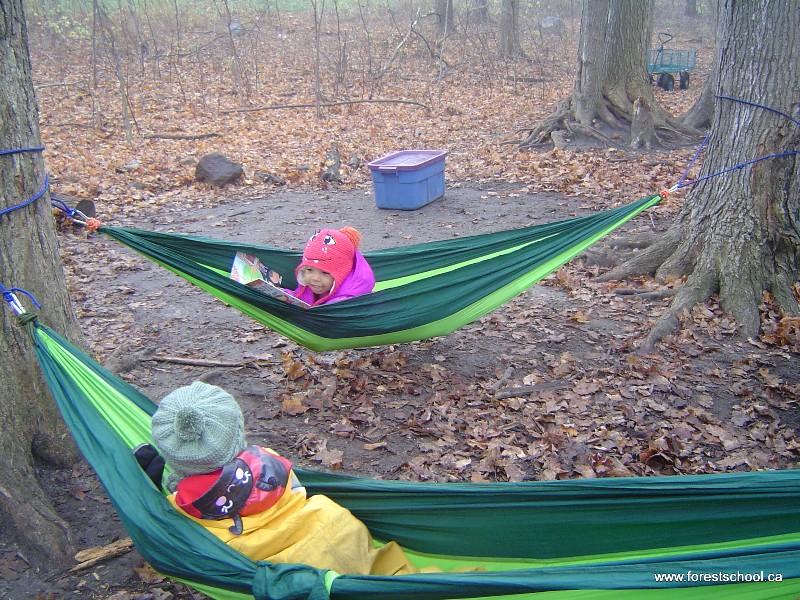
Are you wondering about how you can bring more of the natural world to your space? We have worked with educators from all over Canada to consider this very question. We believe that regardless of your location (cement playground, indoor spaces, or 2 acres of land) that it IS possible. We encourage educators to think about their values and use this to consider their space. We have learned that being a nature-based educator is more than your location. It’s a mindset. Below you will read a story about how we learned from our own experiences to inspire other educators to reflect upon what an intentional environment truly is. We will capture some strategies and tools that you can implement into your classroom to begin connecting more with the natural world.
 In April of 2022, we had the privilege of working alongside Elle Brown in a professional learning
In April of 2022, we had the privilege of working alongside Elle Brown in a professional learning
encounter with the Educators at Bayview Glen Independent School to offer our perspective on what it takes to offer a thoughtful and intentional early learning environment for children. Karen has worked as the owner and Director of Discovery Child Care since 1998 and has been a forward thinker in the environments we create for children. Discovery is situated on 2 acres of beautiful, lush, natural spaces that include forested areas, grassy areas, a fire pit, ropes and tool use areas and so much more. Many have wondered: how has she made this amazing vision possible and we hope to provide you with some helpful tools and tips that can get you started regardless of where you are at in your Nature Based journey.
Here is what their team said about their experience working with us:
“Thank you for a thought provoking, inspiring and reflective journey as you opened up your incredible school with us. Not only did we travel through this session with purpose and intent we did so with open minds and willingness to grow. We saw how the creation of a meaningful environment through collaborative construction was your key to a successful educational journey. We also saw that many aspects of a Forest School are accessible, adaptable and attainable for others to incorporate. Thank you for your time, expertise and passion for the world of Early Learning, we all left with a willingness to take on new adventures, challenges and risks.”
With gratitude,
The BVG team
This opportunity allowed us to reflect together on what really made this vision possible. As a licensed child care program, we have the same governing bodies as all licensed child care centres in Ontario such as the Ministry of Education and Public Health. When many educators see the spaces at Discovery they seem puzzled and ask “How did you do that?!” We are proud of how we have continued to adhere to all the important guidelines and legislation all while challenging the status quo of child care and offering innovative child care for children in Barrie, Ontario. We learned our top 5 tips that we would give any educator when wanting to add a Nature based philosophy into their practice. Keep reading to hear our go-to tips and three amazing (and FREE) resources to support you right now.
If you are interested in bringing more Nature Based learning into your environment and you simply don’t know where to start, we totally understand! There is so much information out there and it can be overwhelming to take the leap. Below are our top five tips to help any educator with bringing more nature-based or place-based learning into your program.
- Adventure Bags: What is an adventure bag you ask? This is the best solution we have found to overcome the challenges you have with having the materials to offer a rich Nature Based program. This bag is accessible and allows you to easily carry all the materials that can support your programs such as field guides, magnifying glasses, and resource books. Click HERE to download the FOUR-page freebie we have made that will walk you through the steps of making your own adventure bags for your classroom.
- Understanding risk assessment and mitigation strategies: It is important to empower yourself with important skills to offer unique opportunities in your classroom. There are great resources from Child and Nature Alliance that will help you in ensuring you have the policies and procedures in place to keep the children safe. Click HERE for this resource.
- Engagement strategies for your stakeholders: It is key that you engage with all in your community and go public with your goals of connecting your program more deeply with the natural world. Our favourite tool to use is pedagogical documentation. You can start by engaging with your leaders, administrators, and families and get a feel for their excitement and their concerns. By learning this, you can use intentional strategies such as Newsletters or parent information postings to speak to some of the common fears and concerns. Click HERE for a FREE family letter that discusses some common concerns about nature-based education.
- Get Personal: Figure out your “why.” It is necessary to understand why you want to do this work. It is going to look different for each and every one of you. This is what will keep you motivated when you encounter roadblocks and will allow you to have the language to communicate how these opportunities are connected to a bigger vision. We recommend that you check out some of the work from Simon Sinek. YouTube is a great place to start and you will find so many resources on figuring out how to connect your work to your values.
- Empower Yourself with Knowledge: As educators, we believe that knowledge is power. The more you know about Nature Based Education, the more you can advocate for its benefits and the ways it will improve the Early Learning experience for the children in your programs. Discovery Professional Learning has over 15 learn at your own pace online modules to help you find new skills and education to empower your Nature-based journey. Some topics include:
-Cultivating an Ecological Identity
-Rituals and Routines that cultivate a connection to Place
-Critically Examining environments
And so much more! Click HERE to get the entire list of online courses that can support your journey and help you find new skills and strategies for your Early Learning programs. These courses have resources and reflections and provide inspiration so you can offer the program you are dreaming of. If you need any support in getting started, reach out to our team at karen@discoveryprofessionallearning.com.
At Discovery, we have over 30 years of experience working in Nature Based early learning environments and we believe that these spaces are what children and educators deserve. If you are looking for professional learning that will support you in your journey as an educator, we are here to support you. We have been working with educators virtually and in person all across Canada to understand how to use their unique gifts, talents, and values to create the programs of their dreams. 
We love thinking with others, so reach out and stay connected by signing up for our email list. We will always keep you in the know about our upcoming events and share a variety of new resources to support you in your journey.
Let’s explore the possibilities together…
